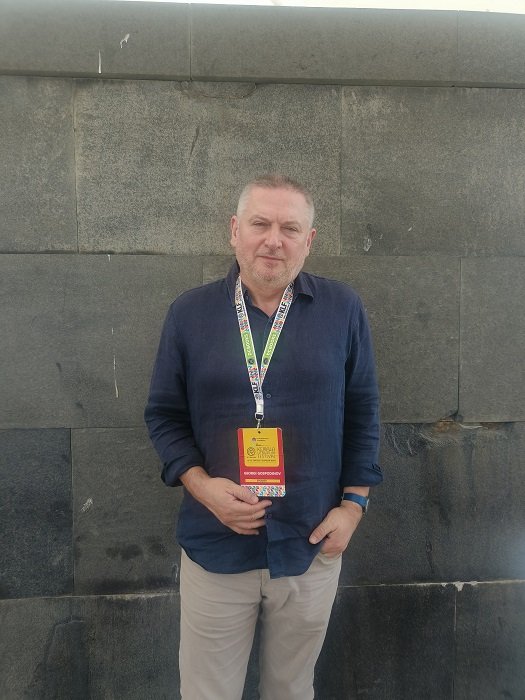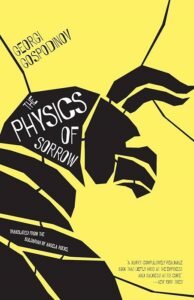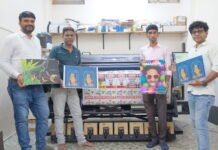
At the Kerala Literature Festival 2025 in Kozhikode, Indian Printer & Publisher’s Priyanka Tanwar had a candid chat with International Booker Prize-winning Bulgarian author Georgi Gospodinov, who shared insights on the prize-winning book Time Shelter, his experience of working with his English translator, Angela Rodel, the impact of the prize on Bulgarian literature, his storytelling style and influences, and much more.
Edited excerpts:
Indian Printer & Publisher (IPP) – Your book Time Shelter won the International Booker Prize 2023. Tell us about the book and how you felt after the prize was announced.
Georgi Gospodinov – Time Shelter is a contemporary novel about the coming of the past now. It’s a book about memory, time, and nostalgia, and how they could also be dangerous in a way. The book is about a character who started building clinics for the past, for people suffering from dementia and Alzheimer’s disease. And after that, because we are facing a deficit of the future, many healthy people would like to live in the past, to go to these clinics for the past. The book finishes with referendums of the past made by different countries. This is a kind of dystopian book.
When I won the International Booker Prize in 2023, it was a big surprise. Of course, because it was the first Booker Prize for a Bulgarian author. The book was timely, and it continues to be timely.

IPP – What were the most challenging aspects of writing Time Shelter?
Georgi Gospodinov – The most challenging aspect was when I had to invent or analyze what kind of nostalgia people from different countries could have. As I said, there was something such as referendums of the past for Germany, France, the UK, and other European countries in the book.
I started to read a lot about them, about popular culture, economics, and everything, and tried to guess if they voted for the happiest decade in the 20th century, which decade would they choose. This was a laborious and cumbersome process.
IPP – Why did you choose the title Time Shelter?
Georgi Gospodinov – Time Shelter is connected with a bomb shelter. When I chose this title, some friends advised me that nobody would understand it, as no young person remembers what it means to be in a bomb shelter. But unfortunately, they were wrong, because after the wars now everybody knows again what it means to be in a bomb shelter.
Time Shelter is playing with bomb shelter. This is a place where you can hide from time and use time as shelter. This is a double meaning, and in Bulgarian, you could use this double meaning. It’s against time, but it’s also for time. You could live in different times.
IPP – Where did you get the inspiration for the book?
Georgi Gospodinov – I got the inspiration from the uncertainty that I could feel in the air, for the anxiety 10 years ago. I think everything started in the last decade. I realized the world will not be the same, and I wanted to write about it, to warn about it. This was my inspiration.
IPP – How was the experience of working with Time Shelter‘s English translator, Angela Rodel?
Georgi Gospodinov – Angela Rodel has also won the Booker Prize with me. She is a beautiful, amazing translator. My books are not easy to translate as I use poetry. For me, every sentence is important. The style is much more important. So, I needed a translator who has, as we say in Bulgaria, an ear for the sound of the language, and Angela is this kind.
She is an American living in Sofia (Bulgaria’s capital). We discussed all aspects during the process of translation.
IPP – In what ways does winning the International Book Prize impact the literature originating from Bulgaria?
Georgi Gospodinov – I think the Booker Prize really opened the door to Bulgarian literature, which is not well known in the world. But now, after 2023, many foreign publishers will be encouraged to ask for Bulgarian writers, and especially young writers. This year and next year, we will have a lot of Bulgarian works published abroad.
IPP – In what ways do translations promote a more inclusive and diverse literary canon?
Georgi Gospodinov – After the Booker Prize, Time Shelter was published in many different languages, including Malayalam. Maybe this is the first Bulgarian book published again in Malayalam. Till now, the book has been published in 40 languages.
IPP – How can we encourage people to read translated literature?
Georgi Gospodinov – It’s very important because when you read literature from different languages and translated works, you will have multiple points of view about the world. Usually, we have only the main language’s point of view, such as English. But I think the stories of people speaking in smaller languages are sometimes even more interesting and more curious. It’s a way to develop empathy for other people.
IPP – Please tell us about your other books.

Georgi Gospodinov – My previous book, which you can find in English, is The Physics of Sorrow – It’s a book about empathy. The main character suffers from extra empathy. It’s also about abandoned people, the Minotaur in Greek mythology, and the history of the 20th century.
The Story Smuggler is a very brief memoir about my first years in writing. It’s about my childhood and writing, because childhood is a very important source for my writing.
IPP – How would you define your storytelling style?
Georgi Gospodinov – My storytelling style is influenced and shaped by the tradition of oral storytelling in Bulgaria. I like this natural way of storytelling, when you can follow your thought. You are not limited to point A to point B. You could stop somewhere. You could return. In my style, I like to talk to the readers. Sometimes I stop the story and say something directly, face to face, to the readers.
IPP – What are the unique characteristics or demographics of the Bulgarian readership?

Georgi Gospodinov – The readership in Bulgaria is improving. I think even young people now like to return to books and literature. Now, we have translations from other languages in Bulgaria. We have a lot of curiosity about foreign cultures. I think people realize that in our turbulent times with the new media, books have again become a source of meaning and consolation.
IPP – Which books from Bulgaria, which have been translated into English, would you recommend to our readers?
Georgi Gospodinov – I’m not sure if they are translated, but I could recommend Bulgarian writers from the 20th century, such as Yordan Radichkov and Ivailo Petrov. I would recommend Bulgarian poets, as we have very good poetry. I could recommend contemporary poets such as Peyo Yavorov and Atanas Dalchev.
IPP – Tell us about your experience at the Kerala Literature Festival.
Georgi Gospodinov – This is my first time at the Kerala Literature Festival. What is amazing is that it gathers so many people. So many young people are gathering around literature. I think it’s very important in a world like ours to have the community organized around books and literature. The second impressive thing is the interesting authors and topics.
I visited the old market in Kozhikode (Calicut). I always love to visit old city markets. However, there was not much free time for sightseeing as I was busy with readings. I met my colleagues who have won the Booker Prize, Jenny Erpenbeck and Paul Lynch, and we had interesting conversations.
The Kerala Literature Festival will be held from 22 to 25 January 2026 in Kozhikode (Calicut), Kerala. The curtain raiser for the ninth edition of the Kerala Literature Festival (KLF) will be held in December.
KLF is organized by the DC Kizhakemuri Foundation, a philanthropic organization formed as a tribute to the founder of DC Books, the late D C Kizhakemuri, a freedom fighter, social activist, writer, and publisher, and recipient of Padma Bhushan.


















I think the power of translation literature really lies in its ability to make us rethink what we know about other cultures. It’s much more than just reading a different language—it’s about opening ourselves to a broader perspective.